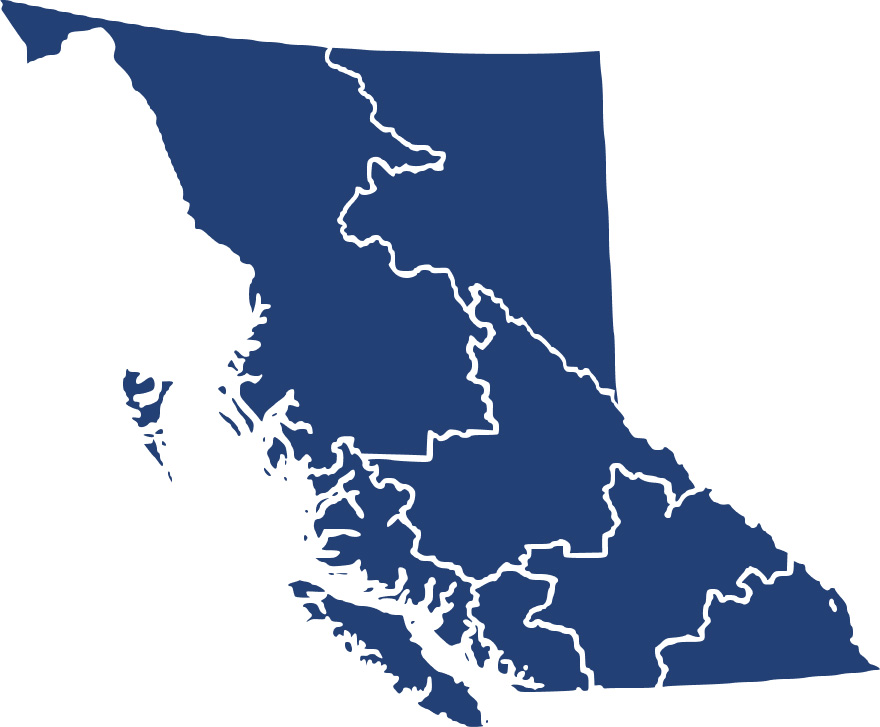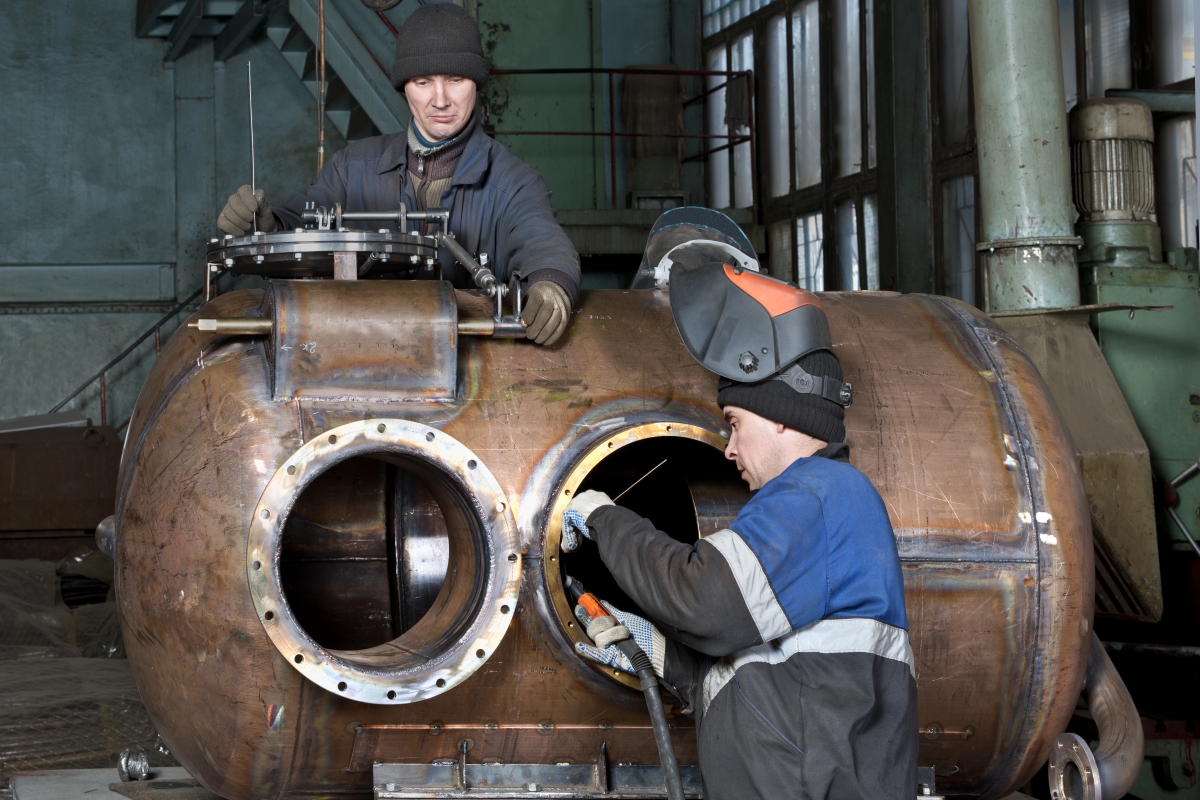Career Overview
People in this occupation:
- Make, assemble, put up, test, maintain and repair boilers, vessels, tanks, towers, heat exchangers and other heavy-metal structures
- Work for boiler fabrication, manufacturing, shipbuilding, construction, electric power generation and similar industrial establishments
Duties
Boilermakers:
- Read blueprints or specifications to plan the order of operation
- Lay out plate, sheet steel or other heavy metal and mark bending and cutting lines on work piece using protractors, compasses and drawing instruments or templates
- Set up and operate heavy-metal working machines such as brakes, rolls, shears, flame cutters and drill presses to cut, shape and form metal into parts or sections
- Fit and weld metal parts or sections together to make boilers, vessels, tanks, heat exchangers, piping and other heavy-metal products
- Erect and install boilers and other heavy-metal products according to specifications using hand and power tools
- Repair and do maintenance work on boilers and other heavy-metal products
- Direct activities of hoist or crane operators and other workers during production, assembly, installation or repair of structures
- Test finished structures using a variety of methods
Special duties
Boilermakers may specialize in rigging and hoisting, preparation and layout, or welding aspects of the trade.
Earnings
Earnings is income that workers receive in exchange for their labour. Depending on the type of employment, earnings can be in the form of wages (hourly), salaries (fixed monthly or annual) or self-employed earnings.
Work Environment
# Workers Employed
365% Employed Full Time
19%Key aspects of the work in this occupation:
- Work usually takes place in factory environments
- Working with equipment, machinery or power/hand tools may be a source of injury
- Workers may be exposed to fumes, and intense light and heat, so safety precautions are taken.
- The workplace may be noisy, which could affect hearing
- Work locations may also be hazardous
Career Pathways
Red Seal trade certification allows for movement between provinces.
Progression to supervisory positions is possible with experience.
Related Careers
Occupational Interests
It’s important to understand what kinds of occupations align with your interests.
For more about occupational interests visit Skills for the Future Workforce > Characteristics.
Here are the top occupational interest(s) for this career profile:
Job Titles
Education, Training and Skills
- Completion of secondary school is usually required
- Completion of a three- to four-year apprenticeship program, or
- A combination of over four years of work experience in the trade and some high school, college or industry courses in boilermaking is usually required to be eligible for trade certification
- Trade certification is compulsory in Nova Scotia, Quebec and Alberta and available, but voluntary, in all other provinces
- Red Seal endorsement is also available to qualified boilermakers upon successful completion of the interprovincial Red Seal examination
Boilermakers who are certified for that occupation by a regulator elsewhere in Canada can apply for the same certification from the regulator in B.C. Under the terms of the Canadian Free Trade Agreement (CFTA), most applicants who are transferring their credentials from elsewhere in Canada will not be required to complete additional training or testing. However, the B.C. regulator may ask applicants to provide further information such as a letter of good standing, references, or criminal record check.
For those who trained outside of Canada and never received certification from any Canadian jurisdiction, a full assessment is likely needed. Most occupational regulators have a process for assessment and recognize internationally trained applicants.
Contact SkilledTradesBC for details on how to apply for certification in B.C.
For information about labour mobility in Canada, visit www.workersmobility.ca.
View a list of Professional Regulatory Authorities in B.C.
Trades training resources
Visit our trades training page at www.workbc.ca/trades to learn about apprenticeship and trades training in B.C.
Education programs in B.C.
The following program areas are related to this occupation:
- Boilermaking

Skills
Every job calls for a certain set of skills. Knowing those skills is the first step in finding a good career fit.
Here, you will find the 10 most relevant workplace skills. Some are more important to achieving success in a certain career than others. These skills may come naturally to you or you may need to gain them through education, training and experience.
See the list of work-related skills below, ranked in order of importance for this career. Check out the list and see if this career matches your skills—take that first step!
Watching gauges, dials or other indicators to make sure that a machine is working properly.
Controlling operations of equipment or systems.
Using logic and reasoning to identify the strengths and weaknesses of alternative solutions, conclusions or approaches to problems.
Conducting tests and inspections of products, services or processes to evaluate quality or performance.
Performing routine maintenance on equipment and determining when and what kind of maintenance is needed.
Repairing machines or systems using the needed tools.
Determining causes of operating errors and deciding what to do about it.
Keeping track of and assessing your performance, other individuals, or organizations to make improvements or take corrective action.
Understanding written sentences and paragraphs in work-related documents.
Determining the kinds of tools and equipment needed to do a job.
Labour Market Statistics
Discover data, facts and information that have been gathered and analyzed. Learn about the characteristics of the economy and labour market in B.C.
Employment
Find out about employment types and trends by region and industry.
Employment
365Employment by Region















| Region | Employment | % Employment of this Occupation |
|---|---|---|
| Cariboo | 40 | 10.8% |
| Kootenay | 25 | 6.8% |
| Mainland/Southwest | 125 | 33.8% |
| North Coast and Nechako | 10 | 2.7% |
| Northeast | 10 | 2.7% |
| Thompson-Okanagan | 70 | 18.9% |
| Vancouver Island/Coast | 90 | 24.3% |
Labour Market Outlook
The B.C. Labour Market Outlook is a 10-year forecast of the expected supply and demand for labour in the province. It’s usually updated every year. The purpose is to provide British Columbians with the knowledge to make informed decisions on careers, skills training, education and hiring.
Forecasted Job Openings (2023-2033)
60Forecasted Job Openings
Forecasted Employment Growth Rate
Composition of Job Openings
Job Openings by Region (2023-2033)















| Region | Job Openings | Avg. Annual Employment Growth |
|---|---|---|
| Cariboo | 10 | -1.1% |
| Kootenay | Not available | Not available |
| Mainland/Southwest | 20 | 0.1% |
| North Coast and Nechako | Not available | Not available |
| Northeast | Not available | Not available |
| Thompson-Okanagan | 10 | 0.8% |
| Vancouver Island/Coast | 20 | 0.2% |
Industry Highlights
Learn about the opportunities in B.C.'s major industries, including employment trends, earning potential, locations of work and more.
Forecasted Job Openings by Industry
| Industry | Job Openings (2023-2033) |
|---|---|
| Manufacturing | 40 |
| Construction | 20 |
| Repair, Personal And Non-Profit Services | 0 |
Resources
-
Boilermaker Contractors' Association (BCA) of Canadawww.bcacanada.ca
-
Boilermakers Lodge 359boilermakers359.org
-
Careers in Constructionwww.careersinconstruction.ca
-
International Brotherhood of Boilermakerswww.boilermakers.org
-
Marine Workers & Boilermakers Industrial Unionwww.marineworkers.ca
-
Mechanical Contractors Association of British Columbia (MCABC)www.mcabc.org
-
National Association of Construction Boilermaker Employers (NACBE)nacbe.com







